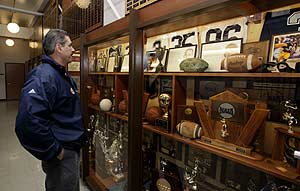A football program in Washington State commits hara-kiri for the sake of the university’s athletic program.
Officials at Western Washington University reported they are dropping the football program, which began in 1903, in an effort to save other less expensive programs. The Vikings’ move is expected to save the university around $450,000 a year. The cuts were announced Jan. 8.
“I have made this decision with a heavy heart as I am well aware of the profound consequences it has on the student-athletes on the football team, their dedicated and hard-working coaches, and on our passionate supporters on campus, in the community and region, and on our alumni,” said Western President Bruce Shepard in a statement on the program’s cancellation.
Athletics expenditures have grown more rapidly than revenues over recent years, due in part to increased travel costs, field rentals, and a relatively flat growth in gift and donation dollars, according to the university.
Recent budget cuts at the University compounded the program’s financial problems. Among all the options considered, the only way to ensure Western can maintain a strong program of intercollegiate athletics is to eliminate football, according to the university.
Shepard’s release also noted the high cost of running a NCAA Division II football program with the lack of geographically close opponents. Western was one of five Division II schools that sponsor football in the western United States, including the states of Washington, Oregon, California, Idaho, Montana, and Nevada.
Eileen Coughlin, vice president for student affairs and academic support services, said that Western’s 15 other intercollegiate sports will not be adversely affected and, in fact, will be better protected as the University faces significant budget cuts.
“At Western, the current degree of success in intercollegiate athletics is noteworthy given that programs are stretched very thinly. Ending the football program will allow intercollegiate athletics to meet budget reduction targets, and, most importantly, to protect the quality of the remaining intercollegiate sports,” Coughlin said.
Current football players on scholarship will continue to receive the financial help should they remain at the school, reported the Seattle Post-Intelligencer. Those players looking to play elsewhere can transfer and be eligible immediately.
Prior to this announcement, Western had only stopped its football program due to war. The program stopped from 1917 to 1920 for World War I and from 1943 to 1945 for World War II.

